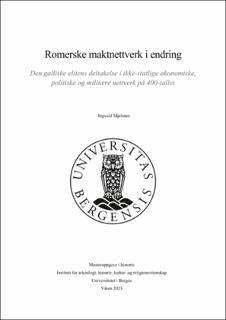Romerske maktnettverk i endring
Master thesis
Permanent lenke
https://hdl.handle.net/11250/3072364Utgivelsesdato
2023-05-15Metadata
Vis full innførselSamlinger
- Master theses [240]
Sammendrag
Det romerske samfunnet i Nord-Gallia gikk gjennom store forandringer fra slutten av 300-tallet og utover 400-tallet. I denne oppgaven undersøker jeg hvordan den nordgalliske elitens deltakelse i ikke-statlige økonomiske, militære og politiske nettverk bidro til å fragmentere romerske strukturer i Nord-Gallia i denne perioden. Jeg argumenterer for at romerske eliter i økende grad skapte og deltok i ikke-statlige nettverk fra slutten av 300-tallet. Dette kunne være ved å danne ikke-statlige militære grupper som opererte som sikkerhetsgarantister i Nord-Gallia. Eller det kunne være samarbeid mellom romerske og ikke-romerske eliter, hvor nordgalliske aristokrater tilbøy administrativ kompetanse mot beskyttelse og tilgang til verdifulle ressurser. Denne oppgaven bidrar til forskningslitteraturen om romerske eliter i Gallia ved å belyse elitens aktive rolle i fragmenteringen av romerske strukturer utover 400-tallet During the 4th and 5th century AD, the inhabitants of Roman Gaul experienced significant changes to their relation to the Roman state. The erosion of Roman structures such as the army, interregional trade and tax networks, and the empire-wide web of Roman officials, eventually led to the permanent loss of Roman state presence in Northern Gaul. In this master thesis, I firstly examine the evidence of the loss of Roman state structure, by analyzing the evolution of Roman economic, military, and political networks from the end of the 4th century and onwards to the middle of the 5th century. Then I examine which role the Roman elites in Northern Gaul played in facilitating and bringing about changes to these Roman power networks. I argue that during the first half of the 5th century, the Roman aristocrats in Northern Gaul were increasingly creating and participating in economic, military, and political networks that operated independent of the Roman state. Due to the Roman state’s lack of ability to provide its inhabitants with physical and economical protection in times of crisis, private military organizations developed. Some of these organizations arose from local elites who hired slaves or ex-soldiers in an attempt both to offer its population protection and strategically taking control over state resources. Others arose from collaboration with non-roman elites, where the Roman elite offered administrative knowledge in exchange for lucrative resources and protection. Previous research on Roman aristocrats in Gaul has tended to portray them as acting in response to invasions or a retreating Roman state. In contrast, this thesis shows that a part of the Roman elites in Northern Gaul took advantage of the social and political unrest during the first decades of the 5th century and strengthened their position in Northern Gaul by creating local organizations or collaborating with non-roman elites. Thus, Roman aristocrats in Northern Gaul played an active role in bringing about the fragmentation of Roman structures in their area.
